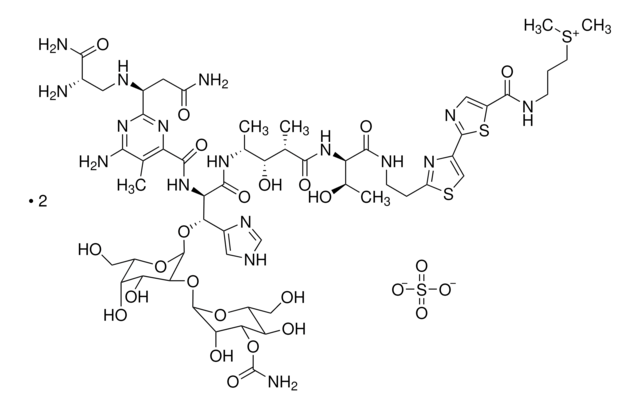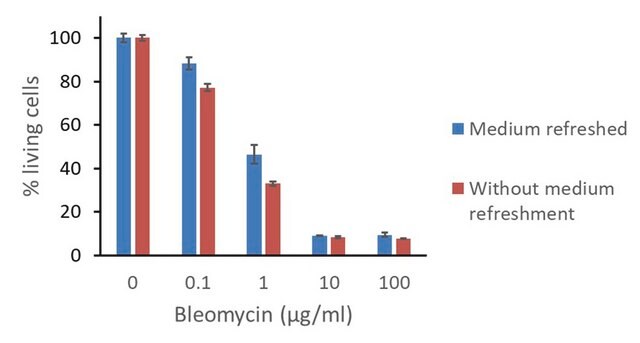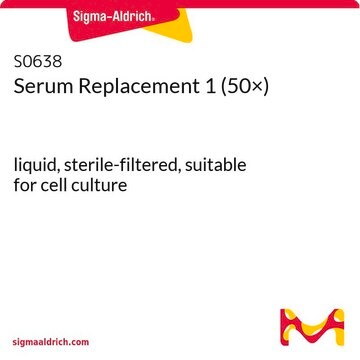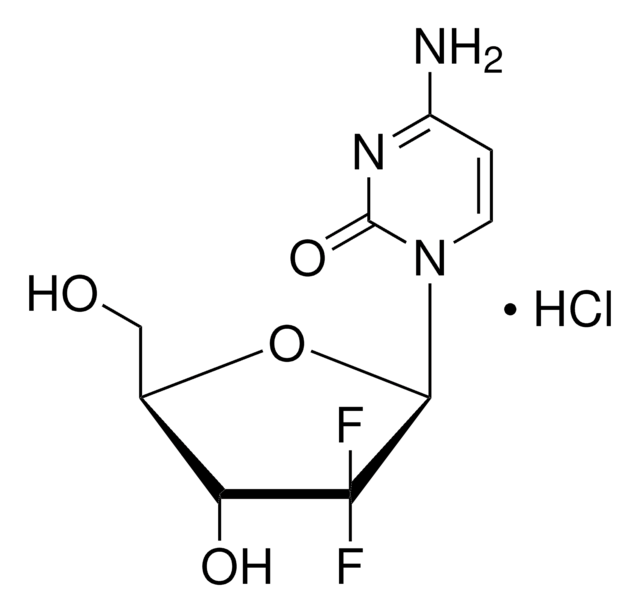15361
Bleomycin sulfate from Streptomyces verticillus
for fluorescence, mixture of bleomycin sulfate salts, lyophilized, powder or crystals, white to off-white
Synonym(s):
Blenoxane, Bleo, Blexane
About This Item
Recommended Products
biological source
Streptomyces verticillus
Quality Level
grade
for fluorescence
form
powder or crystals
quality
lyophilized
color
white to off-white
solubility
H2O: 20 mg/mL, clear, colorless
cation traces
Cu: ≤0.1%
antibiotic activity spectrum
Gram-negative bacteria
Gram-positive bacteria
neoplastics
Mode of action
DNA synthesis | interferes
storage temp.
2-8°C
SMILES string
[O-]S([O-])(=O)=O.C[C@@H](O)[C@@H](NC(=O)[C@@H](C)[C@H](O)[C@@H](C)NC(=O)[C@H](NC(=O)c1nc(nc(N)c1C)[C@H](CC(N)=O)NC[C@H](N)C(N)=O)[C@@H](O[C@@H]2O[C@@H](CO)[C@@H](O)[C@H](O)[C@@H]2O[C@@H]3O[C@H](CO)[C@@H](O)[C@@H](OC(N)=O)[C@@H]3O)c4c[nH]cn4)C(=O)NCCc5nc(cs5)-c6ncc(s6)C(=O)NCCC[S+](C)C.C[C@@H](O)[C@@H](NC(=O)[C@@H](C)[C@H](O)[C@@H](C)NC(=O)[C@H](NC(=O)c7nc(nc(N)c7C)[C@H](CC(N)=O)NC[C@H](N)C(N)=O)[C@@H](O[C@@H]8O[C@@H](CO)[C@@H](O)[C@H](O)[C@@H]8O[C@@H]9O[C@H](CO)[C@@H](O)[C@@H](OC(N)=O)[C@@H]9O)c%10c[nH]cn%10)C(=O)NCCc%11nc(cs%11)-c%12ncc(s%12)C(=O)NCCC[S+](C)C
InChI
1S/2C55H83N17O21S3.H2O4S/c2*1-20-33(69-46(72-44(20)58)25(12-31(57)76)64-13-24(56)45(59)82)50(86)71-35(41(26-14-61-19-66-26)91-54-43(39(80)37(78)28(16-73)90-54)92-53-40(81)42(93-55(60)88)38(79)29(17-74)89-53)51(87)67-22(3)36(77)21(2)47(83)70-34(23(4)75)49(85)63-10-8-32-68-27(18-94-32)52-65-15-30(95-52)48(84)62-9-7-11-96(5)6;1-5(2,3)4/h2*14-15,18-19,21-25,28-29,34-43,53-54,64,73-75,77-81H,7-13,16-17,56H2,1-6H3,(H13-,57,58,59,60,61,62,63,66,67,69,70,71,72,76,82,83,84,85,86,87,88);(H2,1,2,3,4)/t2*21-,22+,23+,24-,25-,28-,29+,34+,35+,36-,37+,38+,39-,40-,41-,42+,43-,53-,54-;/m00./s1
InChI key
OOXTWFJZZAJGKA-CNLAFNBISA-N
Looking for similar products? Visit Product Comparison Guide
General description
Application
Biochem/physiol Actions
Packaging
Components
Caution
Preparation Note
Other Notes
Signal Word
Danger
Hazard Statements
Precautionary Statements
Hazard Classifications
Carc. 2 - Muta. 1B - Repr. 2
Storage Class Code
6.1C - Combustible acute toxic Cat.3 / toxic compounds or compounds which causing chronic effects
WGK
WGK 3
Flash Point(F)
Not applicable
Flash Point(C)
Not applicable
Personal Protective Equipment
Regulatory Listings
Regulatory Listings are mainly provided for chemical products. Only limited information can be provided here for non-chemical products. No entry means none of the components are listed. It is the user’s obligation to ensure the safe and legal use of the product.
JAN Code
15361-1MG-PW:
15361-VAR:
15361-10MG:
15361-1MG:
15361-BULK:
15361-10MG-PW:
Choose from one of the most recent versions:
Certificates of Analysis (COA)
Don't see the Right Version?
If you require a particular version, you can look up a specific certificate by the Lot or Batch number.
Already Own This Product?
Find documentation for the products that you have recently purchased in the Document Library.
Customers Also Viewed
Our team of scientists has experience in all areas of research including Life Science, Material Science, Chemical Synthesis, Chromatography, Analytical and many others.
Contact Technical Service








